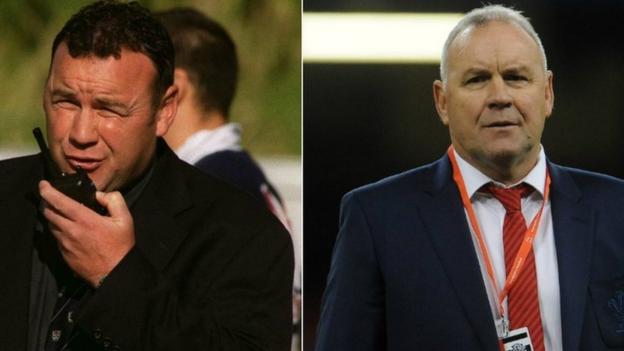
From policing the mean streets of Auckland to coaching Wales.
It has been a long road for Wayne Pivac, taking in Suva in Fiji, sub-tropical Northland in New Zealand and Llanelli on his way to the Principality Stadium in Cardiff.
As he prepares for his opening Six Nations match against Italy on 1 February, BBC Sport has spoken to players and coaches who have seen Warren Gatland's successor first-hand, starting with a World Cup-winning coach.
On police patrol
If it takes an ex-copper to know an ex-copper then Steve Hansen is in a unique position to asses Pivac the man and the rugby coach.
As well as being a former policeman, Hansen coached Wales at the 2003 World Cup and guided New Zealand to the 2015 title.
The pair met through their involvement in the New Zealand police side after rugged back-rower Pivac was forced to retire from playing at 27 because of an injury.
"He was always a very good coach, inclusive and sought out your ideas," said Hansen.
"He had his own ideas as well, so not too bad a coach back in those days. Obviously like all of us he's improved.
"He's a good man and he enjoys life, but he's got a serious side to him as well.
"He is straight up and down, what you see is what you get so it's your choice whether you like what you see."
Hansen was initially coached by Pivac before the duo coached together.
"I was in my 30s by that stage and the old body had a few miles on the clock," recalled Hansen.
"Police rugby was always good, it was entertaining and very enjoyable to go on tour with a good group of like-minded people.
"While it wasn't as intense as provincial rugby, it was a pretty full-on experience."
Pivac has spoken about how his 15-year police experiences helped his rugby career.
"One thing the police does do for you is give you some people skills," said Hansen.
"It does put you under pressure from time to time and both those things are needed in international rugby; you've got to have people skills and you've got to be able to understand there will be pressure and how to deal with it."
Hansen and Pivac became coaching rivals in New Zealand provincial rugby through their respective stints at Canterbury and Auckland.
Pivac's early coaching stints with Takapuna, Northland and North Harbour helped take him to Auckland, where three provincial crowns were secured during his successful tenure. Pivac was named New Zealand coach of the year in 2003.
"We coached against each other quite a bit," recalled Hansen.
"Auckland played some good footie, they wanted to play 15-man rugby, but they were well drilled and I would expect that nothing has changed."
Auckland success
Xavier Rush was Pivac's captain during those Auckland days.
"I was coached by Wayne for about five years and his captain for about four years," recalled the former New Zealand and Cardiff Blues number eight.
"I liked him instantly.
"He wants to enjoy the journey and get the team to enjoy it as well. Each player will want to play for him.
"He has a good way about him and connects with players. He also has the ability to talk with board members as well as the guy coming to his first training session out of school.
"He is a people person, but also no fool.
"He brings very good people in around him and he has already done that with Wales. If you look at some of his early selections he has brought in Welsh icons into his backroom staff and he will bring in the best specialists he can to each area.
"He is not the sort of coach who will want to change everything on day one and he will get a feel for it before he makes changes."
After his success in the provincial game with Auckland, Rush believes Pivac should have had a chance with the Auckland Blues in Super Rugby - but he has never been a head coach in the southern hemisphere's premier competition.
"I thought he was the ideal man when Graham Henry left and why they did not secure him I will never know," said Rush.
"Maybe he was not a big enough name, but he would have been the person I would have chosen after he coached Auckland (in the NPC) to that success."
Flying Fijians
Pivac's next major move was an introduction to international rugby with Fiji in February 2004 to replace Mac McCallion.
Fiji won the Pacific Tri-Nations in his first year and only just lost 11-10 to Wales in a 2005 autumn international in Cardiff.
Pivac also contributed to the World Cup Sevens win in Hong Kong in 2005 with a final victory over New Zealand that sparked spectacular scenes back home.
It was his man-management skills again which impressed some of the top Fiji players, as Pivac realised this unique rugby nation needed a certain approach.
"He came with a big reputation as a hard man and a big team guy and it was all true," said fly-half Nicky Little, who won 71 caps between 1996 and 2011 and enjoyed a club stint with Pontypridd.
"He settled in fine because he had been in Auckland with all the Islanders so he knew how to handle us.
"He brought in a few game plans which is always nice. Wayne was a bit more strict on this because us Fijians when we get a feeling we like to go with it.
"He was just a good bloke, which is what I remember most."
Pivac lasted almost three years before quitting in January 2007, citing family reasons. He returned to New Zealand for further provincial coaching stints with North Harbour and Auckland before his life-changing move to Wales.
'One of the best' - John Barclay
Rush had tried to get Cardiff Blues to appoint Pivac, but that never materialised. It was not long, though, before he arrived in Wales.
Pivac was originally hired by Scarlets as forwards coach in 2014 to work under Simon Easterby but immediately found himself thrust into the top job when Easterby joined Ireland's backroom staff.
Scotland flanker John Barclay had joined the region the season before and the pair were involved in a successful stint with the Welsh region that included the Pro12 title in 2017.
"It was quite tricky for him at first and probably not the smoothest transition," said Barclay.
"He is one of the best coaches and one of the best men I have worked with.
"The main thing he did was the way he monitored and controlled our culture and how we changed it.
"He put a lot of trust and faith in me. I loved my time at the Scarlets and he was a big part in that.
"He made it enjoyable and somewhere you wanted to come and work. When people moved on they were gutted to leave because it was such a great place.
"He had the right people doing the right jobs and never shied away from the tough decisions. He was always very honest with you.
"Part of the success we had with Scarlets was that it was definitely one team and everyone was in it together.
"Even the guys who weren't playing still felt valued."
Entering Gatland's Gates - Eddie Jones
Pivac's achievements resulted in him being appointed as the man to replace Gatland - Wales' most successful coach.
That is something not lost on England coach Eddie Jones.
"Every time Wayne walks through the stadium he walks through the Gatland Gates, which is a reminder of the great success he [Warren] has had," said Jones.
"Wayne has a good pedigree with the Scarlets and coached well at provincial levels and with Fiji, but it will be a step up."
Pivac is not short on belief though as a Welsh Rugby Union behind-the-scenes video demonstrated on the opening day of the Six Nations squad coming together.
He walked into the room with the tournament trophy on the table and told his side their sole goal was to win the competition again.
Pivac will become Wales' fourth New Zealand coach after Graham Henry, Hansen and Gatland.
Hansen coached Wales between 2002 and 2004 and understands the pressure he will be under.
"There's a far bigger expectation in Wales than there is in Fiji," said Hansen.
"Particularly following on from Gats, you know he's been very successful and people expect - and rightly so - that should continue, so the pressure will be on.
"He's a reasonably calm, cool-headed bloke, not too many things ruffle him and he's had a good introduction to it with Scarlets so he knows what it's like.
"But international coaching at that level, tier one? Wales and New Zealand are similar, you know there's a lot of scrutiny on what you're doing and how you're doing it and expectation to do well.
"So that'll be something new. You can talk about handling it, but until you are actually in it and experiencing it you don't know how you are going to act."
So is there one piece of advice Hansen would give Pivac?
"Don't get too far ahead of yourself and enjoy the whole experience."
Wales will be hoping Pivac will do exactly that.
For the latest Welsh rugby union news follow @BBCScrumV on Twitter.
Pick your Wales XV to play Italy
Pick your players from the list below
All pictures by Huw Evans Images.
Can't see this selector? Follow this link.














 Phone: (800) 737. 6040
Phone: (800) 737. 6040 Fax: (800) 825 5558
Fax: (800) 825 5558 Website:
Website:  Email:
Email: 






